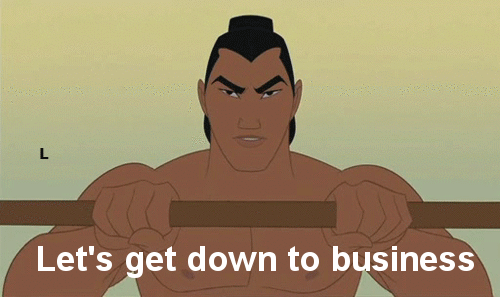Mulan is one of my favorite Disney movies. I'm a firm believer that most of the good Disney movies were made in the 90s and early 2000s--and I'm not just saying that because that was when I was growing up. There was some awesome in writing in many of those releases and today we're highlighting the film of Disney's first Asian princess!
Warning: There's probably spoilers.
1.) Character Skills Foreshadowing - Despite many of Mulan's shortcomings to most people her society, she has many strengths like bravery, cunning, compassion, and love for her family. This is shown early on in the film during the "Honor to Us All" sequence. During this we see how Mulan is going forward with the Matchmaker Meeting besides being nervous because she loves her family and wants their respect, we see her making the winning move on the Pi-Sho game for the two old guys, and her defending the young girl from the bullies.
These are all attributes we see later on in the film, but they are foreshadowed early on so they don't seem to come out of the blue. It would feel awkward if Mulan suddenly decided to shoot the mountain instead of Shan Yu with the cannon if all you'd seen of her was her klutzy side, wouldn't it?
How this can be applied to writing: Like in Mulan, your character's skills and attributes should be foreshadowed early on in the story. Not only does this endear your readers to the character, this makes the character seem more natural and logical when she/he uses one of these skills later.
 |
| Not this cannon sequence. The other one. |
2.) Useful Sidekicks - Many times Disney has random sidekick characters but they don't do much but give the child audience a few extra laughs (Sven from Frozen and Pascal (however cute he is) from Tangled for instance). Mushu and Cri-Kee didn't follow suit. Mushu was essential in helping Mulan survive as a soldier and Cri-Kee helped Mushu in his endeavors like being the mouth piece for his soldier disguise. They were important to the story's plot.
How this can be applied to writing: Make sure your sidekick characters aka secondary characters are important to your plot. Can the plot do without them? Then often that means that they're not needed. Having too many characters can make the story seem cluttered. Every character needs a purpose however cute or funny they are.
 |
| Did I mention Mushu is hilarious? |
3.) Age Appropriate Content - Let's face it, Mulan contains a lot of thinly-veiled mature content such as naked people bathing in a pond, Mulan and Shang getting severely wounded, and an entire battalion plus a village wiped out. But notice how they portrayed all of this content genuinely (Because we've all seen the kid's animated film where we've said, "That person would have totally been killed if this was an adult film.") without it being exceedingly gory or sexual, thus film is appropriate for its intended audience without being explicit.
How this can be applied to writing: It is indeed possible to write a book that is genuine to how bad the world is without making it so explicit it alienates a good swath of your potential audience. I wrote an entire post about this concept for further explanation.
 |
| A few thousand Huns were just wiped out here. |
4.) Circularity - Circularity is the concept of a theme or action used earlier in the story making a full circle back to the end of the story. This adds a neat touch. In this film, the concept having to taken on the identity of another gender to accomplish a task comes in early on with Mulan disguising herself as a man to replace her father. Then this comes in later when the soldiers have to disguise themselves as women to sneak into the palace to save the Emperor.
How this can be applied to writing: Can you have circularity in your story? This isn't an essential element, but it is pretty cool when it's included.
 |
| This part was so funny as well. XD |
5.) Same Goals Different Motivations - Both Mulan and Mushu want to save China, but for totally different reasons. Mulan wanted to do it to save her country and especially to save her ailing father. Mushu wanted to do it so he could get his position back. Like Mushu says "You wanted to do it save your family, I just wanted to do it to save myself." This was an interesting parallel as we saw the two character pursue their goals in different ways.
How this can be applied to writing: This is another fun element to have in a story. It can often be done with the protagonist and the antagonist or with two good characters like in Mulan. Doing this can also create some great conflict. And what's a good story without conflict?
 |
| From the scene where the three characters realized that pretended to be something else to reach their goals. |
We often like films, but we don't know exactly why. When we break them down like this, it is easier to see the workings of what makes a good story. Mulan is one of the many well-written stories out there. I hope you can glean something from its attributes!
 |
| Love this visual with the make up. |
Have you seen Mulan? Have you noticed these writing aspects? What movies have you noticed have good writing? Let's geek out together!
You may also like:



No comments:
Post a Comment